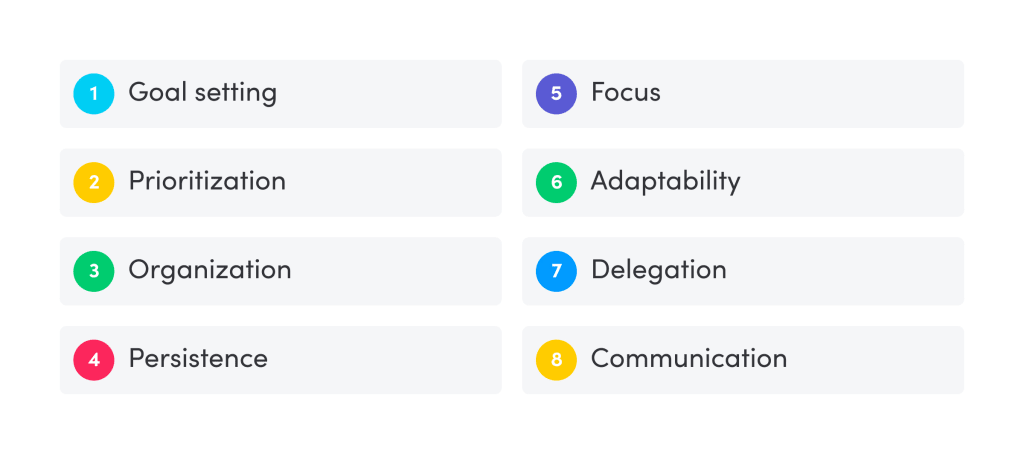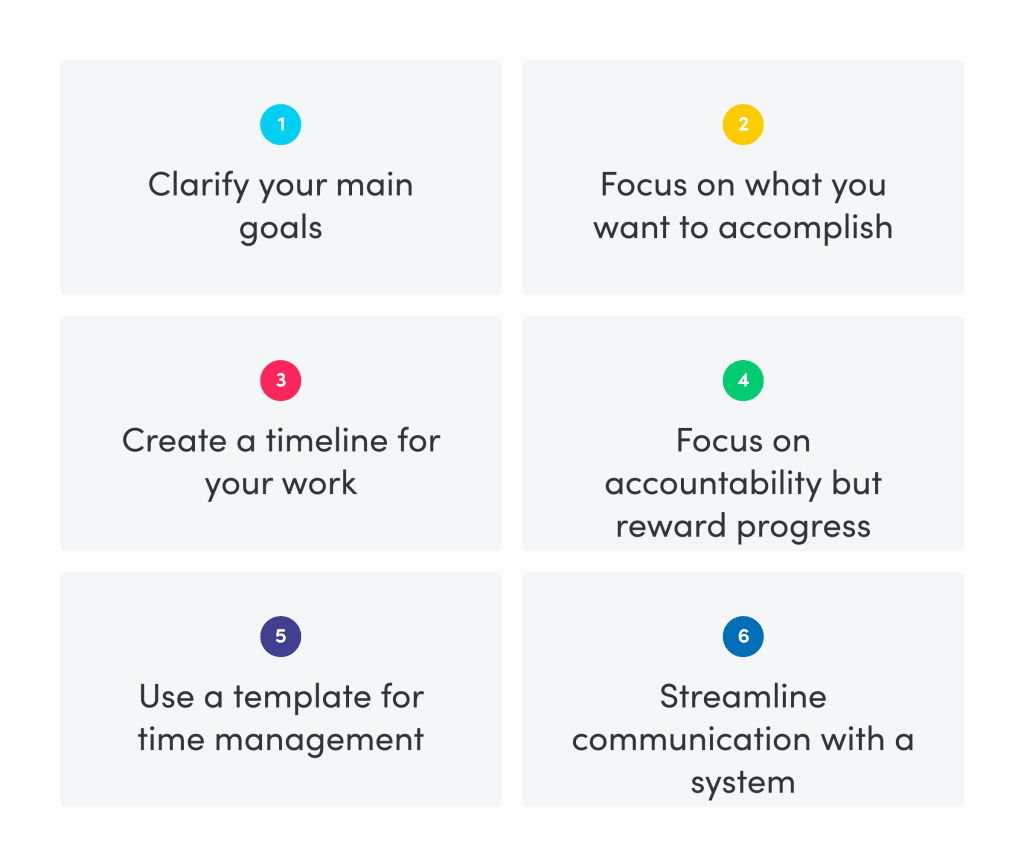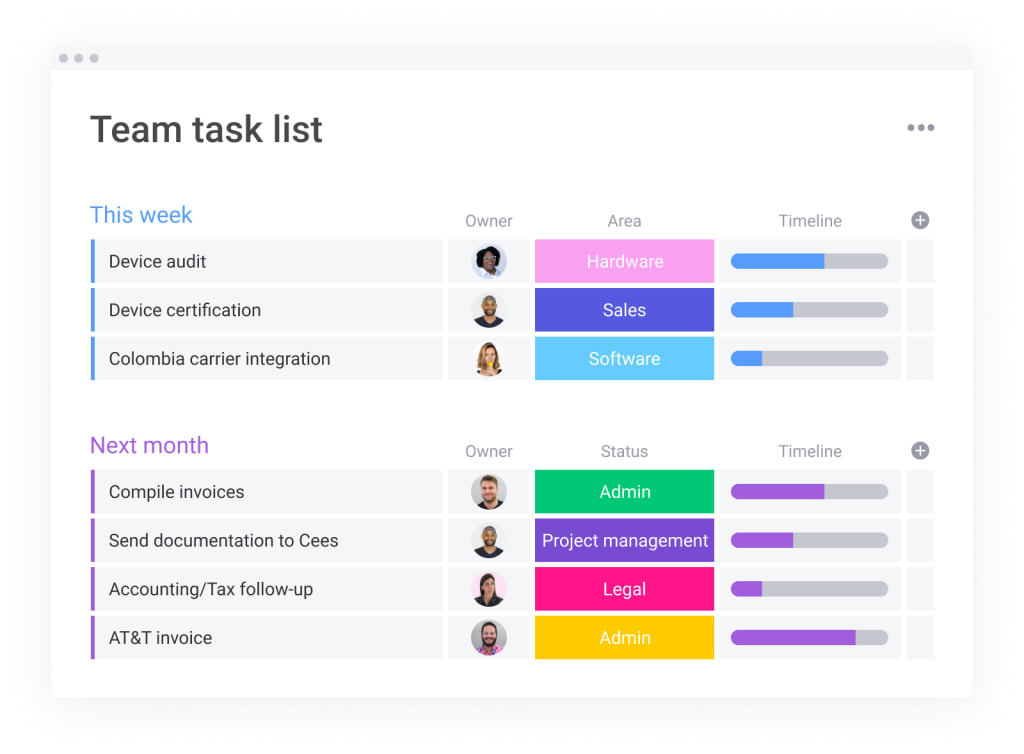Your workday begins with checking your email. There are 50 unread messages in your inbox, plus another handful on Slack. Before you can finish reading and responding to them, you have to run to your first meeting. Finally, you get the cup of coffee you’ve been waiting for, but the day begins rushing by.
More meetings, more emails, and seemingly endless fires to put out. Of course, on top of that, you have actual work to do and deadlines to meet.
By 5 p.m., despite all of your busying and rushing around, your to-do list is still unfinished.
Can you relate to this scenario?
For many employees and leaders, the work day feels like an endless sprint. They constantly feel busy but they aren’t as productive as they could be. This is the result of poor time management — but there’s a way to overcome it.
Time management evades both employees and leaders
This phenomena of unproductive busyness, or what Harvard Business Review calls “active nonaction,” is one of the most detrimental side effects of poor time management.
Active nonaction is when you feel like you’re attending to urgent and important matters, but you’re really just “spinning your wheels.” In the modern workplace, this is far too common.
There are a few main factors that contribute to active nonaction:
Pressure to work fast:
The pace of business is accelerating. For many companies, speed is essential for staying competitive, serving customers, and reacting to changes in the market. But this places tremendous pressure on employees. Rising workloads, concurrent deadlines, and a culture that places urgency on all work quickly turns into unproductive busyness, stress, and burnout.
Desire to display commitment:
Many leaders and employees believe that those who appear busiest also work the hardest and are more strongly committed. This causes employees to willingly work longer days, take on more projects, and participate in more meetings, even if all of that work is not manageable or necessary. New managers commonly fall into this behavior pattern, but it’s widely prevalent among employees who want to prove themselves and earn promotions.
Toxic culture:
If your leadership and culture rewards bad habits like displaying busyness over true productivity and effective time management, you could be creating an atmosphere that encourages active nonaction.
Inadequate digital solutions:
Today, communication, collaboration, and work happens online. That means the act of managing work, as well as the time spent on each task, should also take place on a digital solution — one that is built to seamlessly integrate across all systems, and ideally one that enables automation (and bonus points for making a beautiful workflow). By automating routine tasks, your employees will have more time to spend on complex work (with less stress).
Getting back to basics: What is time management and why is it important?
So how do you move past active nonaction to being a better manager of your own time? Before we dive into all of the important tips and methods you need to know, let’s clarify exactly what we mean by “time management.”
Time management is having the ability to plan and control how you spend the hours in your day so you can accomplish your goals. Effective time management involves establishing clear goals and priorities. This helps you identify which tasks are essential and which are not.
People manage their time across all aspects of life — work, home, social life, side projects, and hobbies. For the sake of this article, we’ll focus on the importance of time management at work.
In our fast-paced digital work lives, time seems to zoom by. Time management allows us to seize each day and get the most out of every hour. It enables us to be more productive and efficient without spending late nights online.
How does time management affect your life?
The way we manage our time has a profound impact on our everyday lives. Consider someone who plans every part of their day down to the minute compared to someone who never writes anything down and simply hopes to remember all of their tasks and deadlines. These two individuals will have very different daily experiences!
The way we manage our time affects:
- What we want to do vs. what we actually accomplish
- How we prioritize what’s really important
- How we make plans
- How effectively we make progress on long-term goals
- How we fit breaks and free time into our days
- Our stress levels (and subsequently, overall well-being)
Our guiding principle for time management: focus on what, not how
Time management affects everything we do. This can seem overwhelming at first and may cause many of us to start planning everything – but this isn’t the right approach.
While there are many different techniques for managing your time, few include agonizing over how you’ll spend every second at work.
Instead, we suggest following to this guiding rule of time management:
Don’t plan out how you will spend your time. Instead determine what you want to accomplish and when.For example, instead of saying, “I’m going to spend four hours building this presentation deck,” say, “I will have half of the deck done by the end of the day.”
This will help you shift focus from the time that is going by (which often leads to those feelings of stress and flightiness), and instead focus on progress and execution.
Adopting it requires a mindset shift, but once you begin using this principle you are one step closer to reclaiming your day and boosting your productivity.
3 characteristics of effective time management
There are three core traits of an effective time manager:
- Accountable – Do you take ownership of your responsibilities?
- Motivated – Are you proactive and driven about using your time wisely?
- Realistic – Are your goals and timelines feasible?
Employees and leaders who fall into the habit of active nonaction are often highly motivated and take accountability for their responsibilities. That’s why they are willing to work so hard, even under lots of stress.
But they are missing the crucial third trait — they are not realistic.
It is not realistic to attempt to get everything done in record speed and at the highest quality. Even the most dedicated and qualified worker is no Superman. That’s why we need to slow down, set goals, and prioritize.
8 time management skills to work on
We know that our approach to managing time must include accountability, motivation, and be realistic. But what skills are necessary for actually putting time management into action?
Here are eight essential time management skills to develop.

- Goal-setting
The first step of time management is to clearly define what you want to accomplish. Whether you’re tasked with an individual project or team initiative, you’ll need to clarify what the outcome will ideally look like before you can understand how long it will take.
2) Prioritization
Having the ability to prioritize your work is perhaps the most essential time management skill. This involves identifying which tasks are essential and should be done first, and which are less important and can be saved for later or delegated. Prioritization helps you create timelines and milestones for moving a project along.
3) Organization
Being organized helps ensure you stay on top of each of your responsibilities and don’t let anything fall through the cracks. It involves organizing resources and information, tracking your progress, maintaining consistent communication with others involved, and keeping tabs on your upcoming deadlines.
4) Persistence
Persistence is an important but often overlooked time management skill. It’s especially important for long-term projects, where momentum commonly drops off after the initial launch. By being persistent and dedicated to your tasks, it will be easier to complete them on time.
5) Focus
Distractions are all around us, and they’re a major contributor to active nonaction. Unless you stay focused on your specific goals, you will find thousands of other things to start doing, emails to answer, fires to put out, and other modes of procrastination. The combined effect of these distractions is a lot of wasted time.
6) Adaptability
Being focused, persistent, and resisting distractions is essential to effective time management, but so is being adaptable. Sometimes, changes occur or issues arise that force us to alter our timelines and priorities. It’s important to recognize when it’s necessary to tweak our plans and not become stressed by change.
7) Delegation
Dividing work between your team or delegating projects to others is crucial to time management. Like we said, none of us are Superman, which means we can’t be responsible for everything and get it done on time. Learning to release certain responsibilities to others can help move projects along while reducing your individual burden.
8) Communication
Clear and consistent communication is necessary for staying on track, especially in the team setting. Communication helps everyone stay on the same page about progress, obstacles, and upcoming work.
What is a SMART goal?
As we mentioned above, setting goals is a fundamental time management skill, and it’s become a major area of focus for experts in time management and organizational skills.
SMART is one method of goal-setting that is designed to help employees and leaders crystalize their objectives into clear and attainable goals. The concept of SMART goals is often attributed to management gurus Peter Drucker and Robert S. Rubin. In order for a goal to fit the SMART method, it must include the following characteristics:
Specific — Is the goal clear and significant?
Measurable — How can you quantify success?
Achievable — Is it realistic and attainable?
Relevant — Does it serve an important purpose?
Time bound — Can you create a timeline to promote progress?
Using the SMART goals checklist helps you clarify your ideas and use your time, resources, and energy wisely to ensure the best outcome.
How to improve time management: 6 tips
If you’ve ever fallen into the productivity trap of active nonaction, here are six time management tips you can start using today.

1. Clarify your main goals (We recommend using the SMART goals checklist) and prioritize the tasks involved.
It’s difficult to achieve success if your goals are unclear or irrelevant. When setting your objectives, be detailed about what you hope to achieve and when.
2. Focus on what you want to accomplish, not how long you have to spend on each task.
After you clarify your overall goals and define what the desired outcome will look like, determine what you want to accomplish at the end of every work session. This will help you create milestones along the way and make progress faster.
3. Before diving into your work, think about what each project will involve and create a timeline.
Understanding what resources you will need and how long each component of the project will take is essential to spending your time wisely. Creating a timeline that outlines milestones and deadlines will enable you to adequately prepare.
4. Develop a culture that focuses on accountability but rewards progress and measurable success (not the appearance of busyness).
The cultural expectations and pressure that encourage active nonaction need to go. Identify which attitudes and experiences have contributed to this type of toxic culture and take steps to create a culture that values quality and progress.
5. Use a time management template to help create a replicable foundation
A time management (or team task management) template can be an invaluable tool for individuals and teams that need to go back to square one. By using a replicable template for each project or initiative, you can create a sense of standardization surrounding work that includes the better use of time.
6. Use a time management system to simplify progress tracking and streamlining communication.
Time management systems such as a Work OS empower team members to easily plan projects, create timelines, update progress, and communicate without exerting extra energy or consuming valuable time. They enable better time management by automating busywork and making it effortless to be organized.
Work OS emerges as the ultimate time management system
In the digital age, a time management approach that coheres with the rest of our digital ecosystem is crucial for creating a smooth employee experience. That’s why a Work OS has become such a mission-critical tool.
A Work OS is your team’s nerve center. It’s a centralized system that integrates with all existing apps and systems while providing an intuitive and seamless platform for managing work. In it, you can list all of your tasks and responsibilities, add comments, tag others, post status updates, ask questions, and track KPIs.
Work OS platforms such as monday.com are designed to help users improve their time management by making it easy to clarify and state goals, delegate work, stay on top of deadlines, and communicate.
For global brand Zippo, monday.com enabled a much easier and more efficient project management, which in turn produced faster project cycles. Since implementing monday.com, Zippo was able to increase its volume of open projects by 87%. It also saved the equivalent of 36 weeks updating its product catalog.
Better time management is the key to your success
Time management — or lack thereof — plays a fundamental role in the success or failure of all work. Without adequate structure or principles to guide how we use our time at work, it’s far too easy to slip into bad habits. Unproductive busyness becomes the norm while important projects get delayed or veer off track.
By following the tips and suggestions in this article, you can increase the speed and quality of your work, even within the most complex of projects.
Want to get started on a better approach to time management?
Check out the following team task template and discover just how productive you can be.


